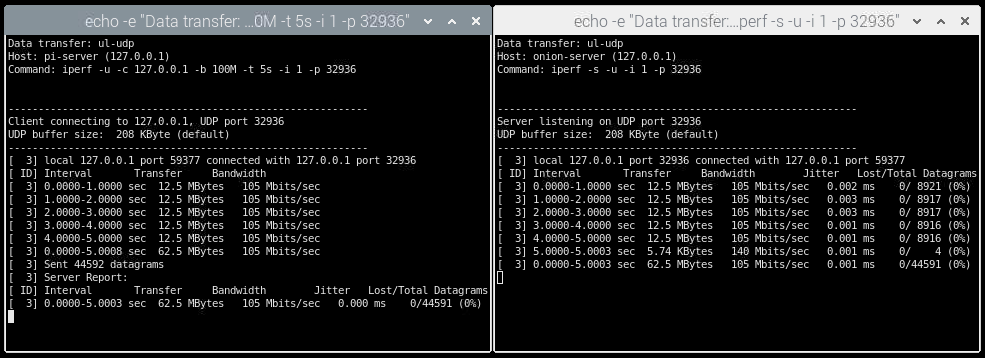__ _____ ___
/ / \_ \ / __\
/ / / /\/ / /
/ /___ /\/ /_ / /___
\____/ \____/ \____/
- it means Linux Iperf Controller
This is a "simple" script that will allow you to run multiple iperfs on multiple hosts. LIC was created during the student times and nowadays there are better solutions (like ansible). LIC can still be useful in environments without Internet access, where it is enough to connect a USB drive and copy the script to your host. In addition, the LIC source code contains many useful tricks in bash, so it's worth having it on the repo ;).
First of all generate a configuration file, which contains iperf commands and host details:
$ ./lic.sh -g config.json
Configuration was saved in config.json
$
Above command creates file:
$ cat config.json
{
"data-transfers": {
"ul-udp": {
"client": {
"cmd": "iperf -u -c 127.0.0.1 -b 100M -t 5s -i 1",
"host": "hostA"
},
"server": {
"cmd": "iperf -s -u -i 1",
"host": "hostB"
}
}
},
"hosts": {
"hostA": {
"ip": "<ip>",
"username": "<username>",
"password": "<password>"
},
"hostB": {
"ip": "<ip>",
"username": "<username>",
"password": "<password>"
}
}
}
Replace <ip> <username> <password> tags in above file with your host data (you can type here your localhost as well). Of course you can also change the cmd parameter - that's why this tool was created 😉. Type there iperf command which should be executed on remote host. For server iperf command skip -p option. Port will be allocated automatically. Parametr host indicates where given cmd should be executed.
Run shell if you already have generated configuration file:
$ ./lic.sh -c config.json
Welcome to the Linux Iperf Controller shell.
Checking libraries...
- jq... OK
- xterm... OK
Checking configuration... OK
Type help or ? to list commands.
(LIC)>
The LIC shell accepts several different commands to manage iperf. Possible commands are listed below.
-
Start data transfer. It will open 2 addtional windows with server and client iperf.
(LIC)> start ul-udp Starting "ul-udp" data transfer... (LIC)>Opend windows:
-
Stop data transfer:
(LIC)> stop ul-udp Stoping "ul-udp" data transfer... (LIC)>Opend windows will be closed.
-
Quit LIC:
(LIC)> quit See you! $ -
Check commands:
(LIC)> ? Commands: start <data transfer name> - start given data transer; if no data transfer name is given then all data transfers from the configuration file will be started stop <data transfer name> - stop given data transer; if no data transfer name is given then all data transfers from the configuration file will be stoped quit or q - quit linux iperf controller help or ? - show this help
The entire tool is contained in one file. This is to make it easier to move the LIC tool between hosts. If you need new functionalities, add them in the lic.sh file. Remember to add new tests after making changes and run all tests.

